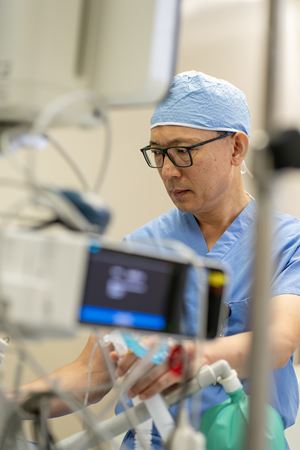INDIANAPOLIS — An international, multi-site clinical study led by an Indiana University School of Medicine researcher and anesthesiologist has found that using advanced technology to monitor tissue oxygen levels in the body during heart surgery does not lower the risk of serious complications afterward. The study was published in the BMJ, a top medical journal owned by the British Medical Association.
Problems after heart surgery — including neurocognitive changes, kidney injury, infection and irregular heartbeats — are common and can be dangerous. Previous studies suggested that poor blood flow and oxygen delivery to the tissue beds of different organs during surgery might be part of the cause; some indicated that tracking oxygen levels might help, but those studies were limited and only looked at one part of the body
“Heart surgery is a major event in a person’s life, and complications can have lasting effects,” said LZ Meng, MD, professor of clinical anesthesia and vice chair for clinical outcomes research in the IU School of Medicine Department of Anesthesia and corresponding author on the study. “By carefully testing new tools and approaches, we can learn what truly helps improve patient recovery and, just as importantly, what doesn’t. That’s how we move the field forward and improve care for every patient who comes through the operating room.
This new, larger study followed nearly 2,000 older adults who had a type of heart surgery called off-pump coronary artery bypass grafting, which helps improve blood flow to the heart. Half of the patients received standard care, while the other half were closely monitored using a special tool called near-infrared spectroscopy, along with real-time tracking of heart and blood pressure data.

Researchers say more study is needed to find new ways advanced technologies can reduce complications following heart surgery. | Photo by Tim Yates, IU School of Medicine
The researchers hoped this high-tech approach would help prevent complications such as kidney problems or heart issues after surgery. However, while the technology did help stabilize oxygen levels in the body during the operation, it didn’t lead to fewer complications overall. About 47% of patients in both groups experienced at least one major issue after surgery.
One promising finding from the study is that fewer patients in the high-tech group got pneumonia (9.1% vs. 12.4%). But researchers said this difference might have happened by chance and needs more study.
“This study gives us valuable answers,” Meng said. “Our findings show that more technology isn’t always better. We need to focus future studies on specific problems, like pneumonia, to see where this kind of monitoring might help improve patient outcomes.
Other study authors include Ziyue Liu of the IU School of Medicine; Jiange Han, Wenqian Zhai, Zhenhua Wu, Zhao Zhang, Tao Wang and Zhigang Guo of Tianjin University; Min Ren of the Tianjin Research Institute of Cardiovascular Disease; and Daniel I. Sessler of UTHealth Houston.
About the Indiana University School of Medicine
The IU School of Medicine is the largest medical school in the U.S. and is annually ranked among the top medical schools in the nation by U.S. News & World Report. The school offers high-quality medical education, access to leading medical research and rich campus life in nine Indiana cities, including rural and urban locations consistently recognized for livability. According to the Blue Ridge Institute for Medical Research, the IU School of Medicine ranks No. 13 in 2024 National Institutes of Health funding among all public medical schools in the country.
For more news, visit the IU School of Medicine Newsroom: medicine.iu.edu/news




